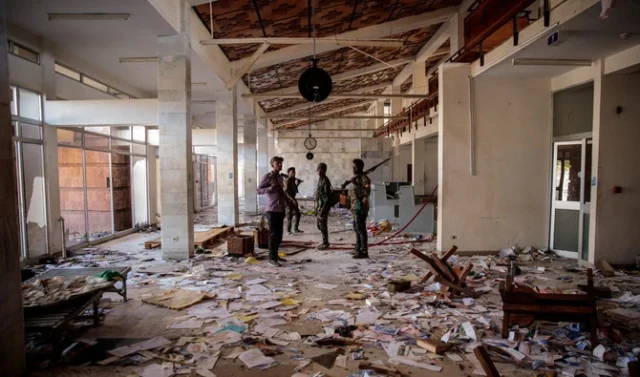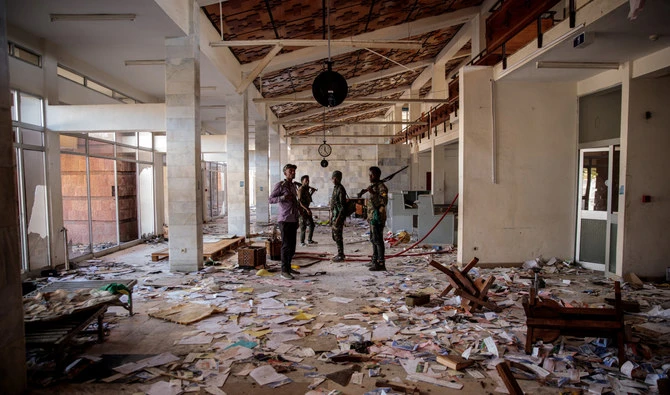
In Ethiopia, within the Tigray state, the conflicts between the factions of Debretsion Gebremichael (TPLF-D) and Getachew Reda (TPLF-G) within the TPLF (Tigray People’s Liberation Front) seem to have found a temporary buffer with the replacement of the latter, now sidelined by the former, with a new interim president, General Tedesse Warede, chosen by Ethiopian Prime Minister Abiy Ahmed; but this is merely a superficial fix. Reda, having left Tigray, is likely involved with the Federal Government in the emergence of a new, unprecedented armed revolt in Tigray against the TPLF authorities, but information on this is still too recent to draw definitive conclusions. Certainly, only Debretsion’s faction within the TPLF possesses real military strength, and therefore any opposition must come from other elements, assisted from the outside; and it is no secret that there are currently various issues preventing the Federal Government and that faction, the TPLF-D, from getting along.
After all, for reasons of political and tactical expediency, the TPLF-D faction has no interest today in being used by the Federal Government in a war against neighboring Eritrea to gain access to the sea, which no one at the international level would be legally willing to endorse anyway. As we also recounted in a previous article, the diplomatic conflicts (potentially capable of escalating into more open conflicts of another kind, and for this very reason entirely unjustifiable) that Addis Ababa is currently displaying with its neighbors, from Eritrea to Somalia and even Djibouti, not to mention its role in supporting the RSF (Rapid Support Forces) in Sudan, are an expression of its leadership’s desire to externalize the numerous and growing internal contradictions, from the economic and currency crisis to the many ethno-military conflicts that are shaking not only Tigray but also the states of Oromia, even Ogaden, and Amhara.
Precisely in Amhara, the second largest and most important state in the country, there has been an armed rebellion ongoing since 2023, increasingly impacting the Federal Government and Army like a veritable hammer blow: with their advance, the FANO militias now control more than half of the districts, as well as other external areas, and have also managed to capture, along with significant weaponry, many Ethiopian soldiers who were supposed to oppose them, not to mention those who even spontaneously defected to their side. The humanitarian conditions in the region are very serious, according to various observers even more severe than in Tigray where, in a discontinuous and disorganized manner, and far from sufficient, some aid has arrived over time (and here we gloss over the nature, and often the real motivations, behind certain aid, because it would open an endless chapter: consider what often arrives, passed off as humanitarian aid but far from being so, such as weapons or ammunition, or into whose hands it ends up, and the clientelistic use that is then made of it); nor have there been a lack of rather bloody events among the various clashes, such as in Bakrat last March, with federal troops targeting civilians, primarily women, based on the principle that “if the guerrilla is the fish and the people its water, then by removing the water, the fish dies.” This is what Mao said, speaking of the essential relationship between the people and guerrilla movements; and this is how the infamous Efrain Rios Montt, former Guatemalan president, replied on how to break that relationship, simply by taking away the water the fish needed to live.
However, despite the serious responsibilities that the federal troops have incurred, with a civilian death toll far greater than seen elsewhere, so much so that various observers are crying out about a veritable massacre of the Amhara by the Federal Government, the FANO continue to advance; even more so if we consider that in reaction, these continuous episodes contribute significantly to their popularity as liberators and patriots. Their objective, and they make no secret of it, is to overthrow the Federal Government, and certainly, if we also consider the simultaneous action of other military groups active in the rest of the country, engaged in the struggle against the central power, the chances of them inflicting a severe attrition are certainly not so remote. Around last year, there were contacts between emissaries from Addis Ababa and the FANO, which at a certain point stalled without resolving the serious regional situation; which has since even worsened, extending to other areas, probably also fueling the fighting spirit of other movements in conflict with the central power, such as the ONLF in Oromia.
In this case too, and especially regarding certain recent resounding successes reported by the FANO, accusations have been launched from Addis Ababa about an external hand that has been fueling them; and the finger has been pointed, as if by chance, at Asmara, now adopted as an easy scapegoat for Ethiopia’s long-standing internal problems. However, this approach, as we have already recounted previously, is to be considered irresponsible and potentially a harbinger of more serious conflicts, which is probably exactly what Addis Ababa and certain particular interest groups with a strong and notorious influence on its political line aim to achieve. This approach, undoubtedly self-harming for Ethiopia and the entire region, does not serve the interests of any of the peoples who live there and responds solely to the ambitions of those groups, comfortably located abroad, from Europe to North America and beyond, who all too often are accustomed to using a country to ride it like a battering ram in Africa and other parts of the “Global South.” Africa does not need these interest groups, political and economic, for whom the lives of Africans serve only to enrich their own power and profits.
Eritrea, which rid itself of the harmful neocolonial influence of these groups from the very first day of its Independence, whose Anniversary will soon be celebrated, and which in all these years has continued to effectively combat them, is the clearest example: an African country can only be truly free and develop having a full sovereignty, and that’s an inalienable right of its citizens. Precisely for this reason, however, always for those interest groups and for the policies of those countries over which they still have influence, countries like Eritrea become the convenient scapegoat to be punished, defamed, sanctioned, and internationally ostracized: just as is happening, and perhaps will continue to happen, for the current conflicts that are now tearing Ethiopia apart, for which however Asmara has no responsibility whatsoever. If anything, Asmara would have an interest in cultivating, with an Ethiopia finally at peace internally and with its neighbors, a fruitful relationship as it has tried on other occasions in the past; and, as demonstrated by past experiences, it would also be happy to offer assistance to heal many of its now chronic difficulties. That is a moment that will arrive sooner or later.
